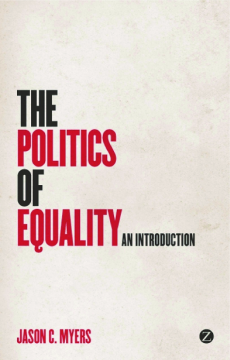
Additional Information
Book Details
Abstract
Why are socialists, communists and social democrats concerned with the distribution of wealth? Why do they place so much importance on public goods such as education and health care? To what extent does democracy matter to socialist ideologies?
In The Politics of Equality, Jason C. Myers sheds new light on questions like this, providing a readable, contemporary introduction to egalitarian political philosophy. Concentrating on ideas and values rather than on the rise and fall of parties and movements, the book offers crucial insights into a vital tradition of political thought and how it is key to our understanding of contemporary debates from Obama's plans for a national health care programme to the recent global wave of economic state regulation.
This is essential reading for anyone interested in constructing a more just society.
'Myers' Politics of Equality is a thoughtful, learned, simply-written attempt to revive a strain of political theory generally considered refuted by events: communism, socialism, social democracy, and related theories of social equality.'
Michael Davis, Illinois Institute of Technology
'The Politics of Social Equality offers a readable entry into the history of egalitarian political theories invaluable for students of political science, economics, or anyone interested in how ideas are transformed into politics - and eventually, reality.'
John Bowe, author of Nobodies: Modern Slave Labor in America
'Jason Myers' The Politics of Equality is insightful, historically informed, and ideologically balanced, a commanding discourse on the theory and practice of democracy.'
Michael Parenti, author of Contrary Notions and God and His Demons
'The Politics of Equality is that rarity: it covers what had seemed to be familiar territory in a manner that casts new light on it in a strikingly original way. It takes nothing for granted, and launches a broad-ranging, clear-headed reconsideration that is an original and significant contribution to the literature on equality.'
Paul Thomas, University of California
Jason C. Myers is Professor of Political Science at California State University, Stanislaus. He is the author of Indirect Rule in South Africa (2013), as well as numerous articles on ideology and political theory.
Table of Contents
| Section Title | Page | Action | Price |
|---|---|---|---|
| About the author | i | ||
| List of figures | vi | ||
| 1.1 Stabilization of the US economy through government intervention | 28 | ||
| 1.2 Shares of income received by US households by quintile, 1967–2005 | 29 | ||
| 1.3 Gini index of US income inequality, 1967–2005 | 29 | ||
| 1.4 US productivity and wages, 1980–2005 | 30 | ||
| 1.5 US labor union membership, 1970–2006 | 31 | ||
| 1.6 Work stoppages, 1970–2006 | 31 | ||
| 4.1 Gini index of income inequality, 2005 | 102 | ||
| Acknowledgments | vii | ||
| Introduction | 1 | ||
| ONE | Historical materialism | 6 | ||
| The materialist theory of history | 8 | ||
| Forces and relations | 14 | ||
| Class and class struggles | 21 | ||
| Figure 1.1 Stabilization of the US economy through government intervention | 28 | ||
| Figure 1.2 Shares of income received by US households by quintile, 1967–2005 | 29 | ||
| Figure 1.3 Gini index of US income inequality, 1967–2005 | 29 | ||
| Figure 1.4 US productivity and wages, 1980–2005 | 30 | ||
| Figure 1.5 US labor union membership, 1970–2006 | 31 | ||
| Figure 1.6 Work stoppages, 1970–2006 | 31 | ||
| Historical materialism and political philosophy | 31 | ||
| TWO | Equal freedom | 34 | ||
| Equality | 34 | ||
| Freedom | 40 | ||
| THREE | Economy and society | 49 | ||
| Exploitation | 51 | ||
| Eliminating the causes of exploitation | 59 | ||
| Modifying the effects of exploitation | 67 | ||
| The community of equals | 81 | ||
| FOUR | Democracy | 83 | ||
| State power | 84 | ||
| Society without the state | 86 | ||
| Political emancipation | 95 | ||
| Social egalitarian democracy | 99 | ||
| Figure 4.1 Gini index of income inequality, 2005 | 102 | ||
| FIVE | Internationalism | 108 | ||
| The founders | 109 | ||
| From the Second to the Third International | 114 | ||
| The International Brigades | 117 | ||
| From internationalism to foreign aid | 118 | ||
| Internationalism as ideology | 120 | ||
| SIX | The privation state | 125 | ||
| Crisis and possibility | 130 | ||
| Conclusion | 133 | ||
| Notes | 135 | ||
| Introduction | 135 | ||
| 1 | 135 | ||
| 2 | 137 | ||
| 3 | 140 | ||
| 4 | 143 | ||
| 5 | 144 | ||
| 6 | 146 | ||
| Bibliography | 147 | ||
| Index | 154 |
